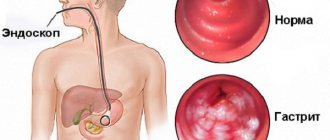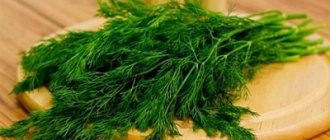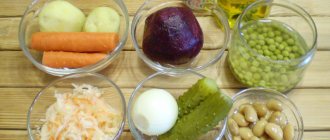How to cook
There are many ways to prepare onion dishes.
You just need to choose the most appropriate one for a particular type of gastritis. Boiled and stewed vegetables retain not only most of their medicinal properties, but also their ability to irritate the walls of the stomach. True, to a lesser extent than raw, so in hyperacid conditions it can be consumed in small quantities. But with severe atrophy or extensive erosions, it’s not worth the risk. Fried onions should be excluded from the diet for patients with any form of stomach inflammation. Increased fat content and the appearance of carcinogens in fried foods are not good for anyone.
But a baked onion is the most harmless delicacy. This product is approved for gastritis of all types. Interestingly, most of the irritating components are inactivated when baked, and the anti-inflammatory and antibacterial effects are preserved - such onions will even be useful.
Patients with gastritis should also not pickle onions. Adding vinegar, salt and hot spices will only enhance the negative effect. Drying the vegetable will also not make it safer for the inflamed gastric mucosa; dried onions are allowed only for hypoacid forms of the disease.
Many people freeze onions to cook later. This option is quite possible if you follow a few recommendations:
- Before freezing, the vegetable needs to be cooked for about 5 minutes to destroy microbes, many of which are resistant to low temperatures.
- You need to let the water drain well so as not to freeze excess liquid.
- After the water stops draining, the onions are packaged in special freezer bags and placed in the freezer.
- Thawed onions can be further prepared according to the same rules as fresh ones.
Many traditional onion dishes are prohibited for patients with gastritis. For example, traditional onion soup, which contains a large amount of butter that is difficult to digest, or fried pies with onions and eggs, like any other dish that requires frying.
Beneficial features
Alternative medicine recommends the vegetable as a proven antiseptic, anti-burn, tonic and general strengthening agent . The iron it contains relieves anemia, vitamins C and E strengthen blood vessels and regulate the process of cell regeneration, potassium helps improve heart function and maintains water-salt balance.
The vegetable provides the daily intake of ascorbic acid and has a beneficial effect on the functioning of the thyroid gland and liver . Green onion juice contains carotene, which is rightly called the source of eternal youth.
- Onions lower blood sugar levels , so doctors advise including them in the diet for type 2 diabetes.
- The vegetable is also useful for hypotensive patients as a tonic.
- It is recommended to include various types of onions in the menu for people suffering from nervous disorders and insomnia.
The vegetable is widely known for its antiparasitic properties. With its help you can get rid of roundworms and lamblia.
Is it possible to eat onions if you have gastritis?
We asked a practicing gastroenterologist whether it is possible to eat onions with gastritis; we posted her answer below.
The consequence of this is inflammation of the mucous membrane lining the stomach from the inside.
That is why gastroenterologists recommend that patients with gastritis or ulcers include onions in their diet with great caution.
Low acidity
If gastritis occurs with reduced secretion of gastric juice, the product should be consumed with caution, and if the disease worsens, it will have to be abandoned
Which variety should you prefer?
Under the usual name “onion” (in fact, onion is a whole genus of plants from the Amaryllis family) hides many varieties that differ not only in appearance, but also in taste. As you know, there are sweet and spicy varieties. The latter contain a larger amount of glycosides, which give bitterness.
- For stomach diseases, such as ulcers or gastritis, preference should be given to a vegetable of an unconventional color, purple or red.
- But white and yellow are not recommended to be consumed raw.
Shallots, which are small in size and oblong in shape, are also characterized by a mild taste.
Feather onions are an excellent component for vegetable salads, and in the cold season one of the few available sources of vitamins. But with high acidity, green onions are contraindicated because they stimulate the secretion of gastric juice.
Leeks have gained popularity due to their mild taste and lack of pungent odor. The vegetable is found in first and second courses and goes well with meat or fish. This product is eaten both raw and after cooking.
Don’t forget that leek’s composition differs little from the usual onion, so it should also be used with caution. https://www.youtube.com/embed/6Sv09BXc-AE
Boiled and baked
It should be noted that the advice on limited consumption concerns vegetables that have not been cooked. Allicin and thiosulfate contained in raw onions irritate the mucous membranes, causing pain and heartburn.
Boiled or baked onions retain most of the nutrients. After prolonged heat treatment, only the content of ascorbic acid decreases. Other beneficial properties of the vegetable are preserved in full.
Fried onions are contraindicated for stomach diseases. It is better to use boiled vegetables when preparing dishes.
You can also reduce the severity using another culinary technique - blanching. The product, cut into rings, is doused with boiling water, after which it is used as a component of various dishes.
If doctors answer positively to the question whether boiled onions can be used for gastritis, then before consuming a blanched product, it is better to consult with your doctor. This method is more suitable for patients whose gastritis occurs with low acidity. After blanching, onions will not mechanically irritate the mucous membrane, but stimulate the production of gastric juice.
It must be remembered that each person’s disease progresses individually, so only a doctor observing the patient can give more accurate recommendations.
Onion - what is it?
Onion is a perennial herbaceous plant from the onion family, growing in many countries and combining more than 400 species.
It has become famous as one of the oldest vegetables cultivated by man. The plant, which was extremely popular in the Mediterranean region as early as 4 thousand years BC, still acts as the most important vegetable crop today.
The unique medical purpose of onions has long been known to man. Even Avicenna, in his canon of medical sciences, noted its excellent disinfecting, antiseptic and disinfecting properties.
In cooking, onions are fried, baked, boiled and used fresh in countless dishes. It is distinguished by a whole range of useful substances: flavonoids, essential oils, trace elements, minerals, etc.
But this amazing set also contains danger. For epigastric pathologies, it is necessary to include this vegetable in the diet with great caution. It is contraindicated for ulcers, cholecystitis and pancreatitis in chronic and acute forms, gastritis
Heat treatment of onions for gastritis
It is very important to choose the right cooking method. Let's look at three types of onions: fried, boiled, baked
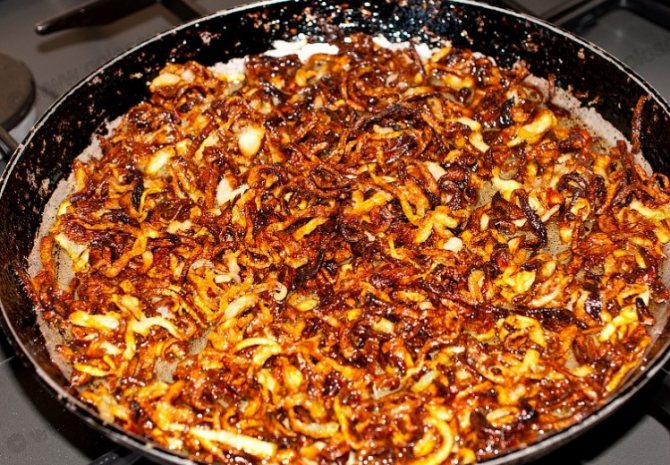
Important! Eating fried onions during gastritis is prohibited, and in acute stages of the disease it is even dangerous!
Boiled onions
Boiled onions are much less destructive for gastritis. It preserves most of the beneficial vitamins and microelements, but at the same time the irritating effect is reduced. Therefore, boiled onions can be consumed for gastritis, but it is worth considering that not all stages of inflammation are allowed to use this product.
If you have an exacerbation or the erosion is very extensive, then even boiled onions are prohibited. It can lead to very painful sensations and further aggravation of the disease, despite the fact that the product has been heat treated. In other cases, a cooked product can be a good alternative to a fresh one.
Stewed onions for gastritis
At the acute stage of the disease, eating onions in any form is prohibited for gastritis. As soon as the painful symptoms can be relieved and the gastroenterologist deems it acceptable to consume vegetables, onions can be consumed stewed or boiled. Doctors usually prohibit the consumption of onions in any form for those patients whose gastritis is accompanied by low acidity.
With increased acidity, provided that it is properly stewed, onions have the following beneficial properties on a weakened body:
- helps improve metabolism;
- activates the production of blood cells, improving hematopoietic processes;
- normalizes the functioning of the endocrine and nervous systems;
- acts as an antimicrobial, antifungal agent.
If the patient does not know what form of gastritis he has, then it is not recommended to take unnecessary risks. If a patient develops gastritis rapidly, then an incorrect diet will not only lead to a general deterioration, but will provoke the appearance of other pathologies, and most often causes an ulcer.
When gastritis enters the stage of persistent remission, you also cannot rush to change your diet; you must first consult with your doctor
In addition, if the gastroenterologist allows the introduction of dishes containing stewed onions into the patient’s diet, this should be done with extreme caution. When cooking, use only fresh onions, preferably organic ones.
During the cooking process, follow a special stewing technology, which means excluding spices, hot, salty and anything that can provoke a relapse from the ingredients, make sure that during the stewing process the onions reach the desired condition. The food consumed must be absolutely fresh and not very hot.
Even when stewed onions are not considered contraindicated, you cannot eat them in large portions. It is also not recommended to abuse such dishes. You need to eat rarely and in small portions, especially if the patient has only just begun to switch to a regular diet.
An imbalance in the digestive system will be noticed immediately. In the case when it is too early to introduce stewed onions into the patient’s diet, he will experience a feeling of discomfort, burning, and possibly pain. However, it is also impossible to think that the reason is hidden only in the bow. It will be necessary to assess in general what the patient ate; perhaps the problem lies elsewhere.
Baked onion
If all previous types of processed onions had to be eaten with caution, then you can safely include baked onions for gastritis in your diet! In any case, boiled onions still retain some of their irritating properties, so they may not be suitable for everyone. But baked vegetables are allowed even in the presence of ulcers and erosions
This type of onion preparation can be a real salvation for gourmets with gastritis. Not only can you use baked onions for gastritis, but they will also be useful! All irritating substances have already been destroyed, but the beneficial properties remain. Therefore, this type of heat treatment is ideal for people with stomach diseases.
| Type of heat treatment | Acceptability degree | Increased acidity | Low acidity |
| Fresh onions | Low | Not recommended | Not recommended |
| Boiled onions | Average | In small quantities | In small quantities |
| Stewed | Average | In small quantities | In small quantities |
| Fried | Low | Not allowed | Not allowed |
| Baked | High | Recommended in small doses | Recommended in small doses |
What are the benefits of onions?
Onions are a real storehouse of substances beneficial for your health. It contains ascorbic acid and vitamin A, vitamins K, E, B1, B2, B9 and PP, carbohydrates, polysaccharides, zinc, iron, manganese, fluorine and other useful microelements.
Vitamin A or beta-carotene contained in onions, as an antioxidant, strengthens the immune system and affects vision and the nervous system, participates in hormonal activity and bone formation. Vitamin E or tocopherol affects the absorption of proteins and fats, supports the immune system, and promotes blood clotting.
Vitamin C is also known as a very strong antioxidant that promotes collagen production and promotes redox processes. Thiamine or vitamin B1 controls metabolism and harmonizes the nervous system. Riboflavin (vitamin B2) takes part in hematopoiesis and the synthesis of nerve cells, in the functioning of the adrenal glands.
Folic acid (Vitamin B9) helps the body absorb protein and form DNA. And vitamin PP regulates cholesterol and blood sugar.
The benefits of the plant for the body are undeniable, but, as with any powerful force, the energy of onions must be handled carefully so as not to harm the body.
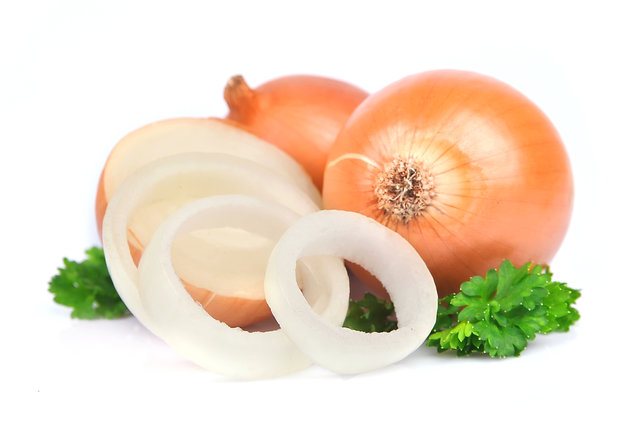
Making marshmallows at home for patients with gastritis
Having mastered such an easy-to-follow recipe, you will be able to experiment with flavors, which will cause absolutely no harm to your sensitive stomach, because all the ingredients will be natural. Necessary ingredients: pectin – 65 grams, sugar – 930 grams, citric acid – 1 teaspoon, soda – half a teaspoon.
Then beat the mixture with a mixer for 7 minutes, repeat three times with an interval of two minutes. Add citric acid and the specified amount of soda, beat. Leave it to brew. Place (use a piping bag or regular plastic bag) the marshmallows onto the prepared surface. The marshmallows should harden, which will take about 24 hours.
- https://gastritinform.ru/hnb.com.ua/articles/s-zdorovie-zefir-3000
- https://vseprogastrit.ru/pitanie-pri-gastrite/sladkoe-pri-gastrite/zefir-pri-gastrite/
- https://tvojzhkt.ru/bolezni/gastrit/mozhno-li-est-zefir-i-shokolad-pri-gastrite.html
- https://gastritinform.ru/gastryt.ru/pitanie/vafli-pri-gastrite-mozhno-li.html
- https://centerzdorovia.ru/mozhno-li-pri-gastrite-zefir
Post Views: 2,514
Composition and benefits of vegetables for the body and gastrointestinal tract
The composition includes many useful substances that have a positive effect on the human body. These are proteins and carbohydrates, water, pectins, fiber (dietary fiber), mono- and disaccharides, ash and organic acids. It is also rich in vitamins B, B 1 (thiamine), B 2 (riboflavin), B 3 (niacin), B 9 (folic acid), it also contains vitamin C (ascorbic acid), E (tocopherol).
Some substances in fresh onions irritate the walls of the stomach, stimulating the secretion of digestive juice, which increases the pH in the organ, and this can lead to exacerbation of gastritis.
Micro- and macroelements included:
- potassium and calcium;
- magnesium and sodium;
- phosphorus, fluorine and manganese;
- cobalt and iron;
- zinc and copper.
Onions for gastritis
Raw onions should be included in the menu with great caution for various pathologies of the gastrointestinal tract. In most cases, the use of this plant for gastritis is not allowed due to the phytoncides and essential oils it contains in excess.
They act aggressively on the inflamed walls of the stomach and intestines, which, moreover, react poorly to rough, fibrous foods. This is how the secretion of hydrochloric acid is activated above normal from the glands located in the surface layer of the epithelium. This can provoke the appearance of ulcers on the mucous membrane with all the ensuing consequences.
Still, this sharp and piquant vegetable is very useful, but it should not be abused for gastritis with high acidity. Onions increase gas formation, therefore they are also contraindicated for people prone to flatulence in the intestines caused by dysfunction of the digestive system. The exception is cases when gastritis occurs with low acidity without exacerbations.
Heat treatment is the solution to all problems. It is in this form that onions can be eaten for gastritis and duodenal ulcers. Fried onions are strictly prohibited for any forms of gastritis and its ulcerative manifestations. Pickled and canned onions are also prohibited, in principle, as are any products prepared in this form.
Onions for gastritis with high acidity
What causes increased acidity? It is mainly caused by excessive alcohol consumption, smoking, spicy, salty and fried foods. Vegetables, including onions, also affect the acidity level.
The essential oils and phytoncides contained in its composition irritate the mucous membrane, which ultimately leads to an inflammatory process. It is for this reason that eating leeks raw is undesirable for gastritis. Especially if the disease occurs against a background of increased acidity.
This product, which is beneficial for human health, also contains bitter essential oils, so for gastritis with high acidity it should be consumed exclusively in boiled or baked form.
Boiled onions for gastritis
Boiled vegetables have a softer consistency and are not crunchy, unlike fresh ones. And it tastes more delicate and sweet, almost devoid of bitterness. It does not irritate the mucous membranes and is perfectly absorbed by the body. Therefore, it is recommended to use boiled onions for pancreatitis. It will not cause an exacerbation of the disease, unlike fresh. On the contrary, it will provide the body with a large amount of useful substances.
In addition to the benefits, boiled onions can also cause harm. Especially if you consume it in too large quantities. A boiled vegetable can provoke an attack of flatulence and diarrhea, bloating, and also cause discomfort in the stomach. It is also possible to have an allergic reaction to boiled onions. There is also individual intolerance to this product, so you should be more careful when including it in your diet.
Green onions for gastritis
As is known, gastritis is accompanied by inflammation of the gastric mucosa, which, as a rule, is associated with a disruption of the normal secretion of gastric juice - often the tissue begins to secrete large amounts of enzymes and hydrochloric acid, which digest their own gastric cells.
How do green onions affect the digestive tract during gastritis? This product contains some phytoncides and essential oils that irritate the gastric mucosa, which only worsens the situation. Onions stimulate the production of hydrochloric acid, increase the acidity of gastric juice, which negatively affects the condition of the tissues of the digestive tract. That is why raw green onions are contraindicated for gastritis. Although there are still some exceptions.
By the way, green onions for gastritis with low acidity are not capable of doing much harm, because in this case the task of treatment, on the contrary, is to activate the synthesis of hydrochloric acid. In addition, this product can be consumed boiled or stewed (for example, in soup) - after heat treatment, the onion loses its irritating properties.
Where is the stomach located in the body, and what to do if it gets sick?

The most common type of illness is when the stomach hurts. Almost every person has experienced this condition. Getting back to feeling great can sometimes be difficult. It is important to know the causes of the disease, and it will be easier to cope with it.
The nature and strength, prevalence and frequency of relapses of stomach pain vary. Some experience dull or sharp pain, others experience cramps, others experience slight discomfort, and still others have constant stomach pain. Nausea and vomiting often accompany such manifestations. A doctor or ambulance paramedics will help you understand the situation.
- 1Sources of discomfort
- 2What causes the discomfort?
- 3Gastritis
- 4First aid for acute manifestations
- 5Tips of traditional medicine
1Sources of discomfort
Why does my stomach hurt? Both young and older people ask themselves this question. Doctors often use the specific concept of “stomach colic,” which determines the nature of the pain not only in the stomach. There are a lot of systems and organs located in the gastrointestinal tract and peritoneal cavity:
- Stomach.
- Liver.
- Intestines.
- Gallbladder.
- Pancreatic gland.
A disorder in each of them can cause pain in the abdomen or directly in the stomach. But the symptoms are different for all manifestations:
- Burning.
- Distension.
- Ripple.
- It's a dull pain.
- Cramping pain (it goes away and then appears again).
- Severe cramping pain.
- When it hurts very much, to the point of loss of consciousness.

Sources of malaise can be not only organs directly related to the digestion of food and the functioning of the gastrointestinal tract as a whole. Sometimes the stomach experiences discomfort from the malfunction of neighboring systems. Nearby are the kidneys, lungs, uterus, and ovaries.
Often, if the stomach hurts badly, the reason lies in the disease of this particular organ. Doctors call cramping pain that occurs when the digestive system does not function properly as gastralgia. This disease is also caused by nervous disorders. It is known that the stomach contains a mass of nerve endings.
If a person suffers from gastritis, especially in chronic form, the pain he experiences is not acute, but the attacks are often repeated. Some patients do not even notice such manifestations over time.
A stomach ulcer manifests itself much more clearly. The pain does not subside, and the patient often does not know what to do when it hurts so much. You need to call an ambulance and go to the hospital. Not only an ulcer can lead to such troubles. Pain is caused by a developing tumor of any type.
2What causes the discomfort?
If your stomach hurts, you should remember and pay attention to the accompanying conditions. The pain may become noticeable immediately after eating. When a person notices discomfort after eating, doctors often suspect gastritis. This is how the stomach reacts to hard food. For example, for fried coarse meat, plant foods, canned food.
Stomach pain can be caused by a number of other reasons:
- hypothermia;
- intoxication;
- constant poor nutrition;
- large time intervals between meals;
- large amounts of food taken at one time;
- long hunger;
- abuse of fatty, fried, sweet, pickled foods;
- smoking;
- drinking coffee in large quantities.

When an ulcer occurs, pain can occur 1.5-2 hours after eating. If the quality of the food was unacceptable for your digestive tract to process, discomfort may occur. If the patient refuses to eat, this aggravates the situation, since in this case no less harm is done to the stomach. Some abstinence from food is useful during attacks of pancreatitis, when enzymes begin to cause irreparable harm to the stomach, and only fasting will help the patient recover. But for other diseases, a special diet is needed.
A large number of people cannot tolerate cow's milk. My stomach starts to hurt and I start vomiting. In this case, it is important to understand in time what causes discomfort and exclude this component and dishes based on it from the diet.
What should you do when your stomach hurts? It is important to stop eating rough food for a while. You can eat boiled potatoes (never fried), light broth, baked vegetables are useful. It is advisable to visit a doctor, undergo a detailed examination and receive treatment.
3Gastritis
The most common manifestation of pain is gastritis. According to its characteristics, this disease is divided into several types:
- Bacterial (caused by Helicobacter bacteria).
- Acute due to stress.
- Erosive (as a result of long-term use of medications, alcohol, spicy foods).
- Fungal.
- Viral.
- Eosinophilic (due to allergic reactions).
- Atrophic (due to thinning of the gastric mucosa).
In addition to such manifestations, the stomach can get sick for a completely banal reason - from simple overeating. Food is not digested normally, and a process begins that is popularly called “indigestion.” Diarrhea and constipation lead to stomach pain.

Physical fatigue or slight overstrain of the abdominal muscles sometimes causes discomfort in the abdominal area. Unpleasant sensations often go away on their own. But if your stomach hurts due to infection, you should urgently call a doctor. The doctor who will help is a therapist, gastroenterologist. Otherwise, spasms and vomiting, if any, will lead the person to complications. Even food poisoning can cause irreparable harm to health.
Often, ordinary gas formation causes significant trouble. This can be prevented if you take special medications as prescribed by your doctor and avoid certain foods. Among them:
- legumes;
- products containing yeast;
- flour;
- apples;
- cabbage;
- carbonated drinks;
- milk;
- corn.
If your stomach hurts badly, it is best for a specialist to determine what to do. But from his own observations a person can understand what is worth doing and what is not. For example, if a patient experiences discomfort after taking fermented milk products, you need to stop eating them and examine the state of the microflora of the stomach and intestines.
4First aid for acute manifestations
If your stomach hurts badly, which disrupts your plans, it is advisable to try to drink water. It must be clean and neutral (without gas or impurities). Avoid eating for several hours. An excellent solution would be to refuse food until the next day. If there is vomiting, you definitely need to abstain from food for at least 6-8 hours.

If water does not help, you can find suitable medications at the pharmacy, but before doing so, consult your doctor to see if it is worth taking them in your particular case. In some situations, simple painkillers can make pain worse.
Do not succumb to stressful situations or conflict. Stomach pain is often associated with nervous tension. For preventive purposes, it is important to eat right and lead a healthy lifestyle.
And yet, what to do if your stomach hurts? There are some techniques that will significantly alleviate a person’s condition. Among them:
- Stick to a relaxed diet.
- Give yourself the opportunity to fast for medicinal purposes.
- Give your body fasting days.
- Be sure to give up some foods.
It is better not to eat: baked goods, fried foods, alcohol, sour fruits or vegetables, coffee, tea, spicy and overly salty foods. Dishes need to be steamed or boiled. The diet is based on products such as: fresh herbs, fruit and vegetable juices.
Dish recipes
Baked onion
A dish from English cuisine, suitable for preparing and serving for gastritis - original, simple and affordable!
Prepare the oven - preheat it to 200 degrees.
We peel the onion and trim the bottom and top of each bulb, making “barrels” that allow it to stand. We make a cross cutout on top.
Wash and chop fresh bacon.
Peel the garlic and grind it in a mortar with pepper and salt.
Soften the butter, combine it with the bacon and garlic mixture. We send the resulting mass into the onions, filling them with it.
Place the onion on a baking sheet and bake in the oven for up to half an hour.
A healthy and tasty dish is ready. Bon appetit!
- Onions 6 pcs.;
- Bacon 150 gr.;
- Butter 50 gr.;
- Garlic 3 cloves;
- Freshly ground black pepper 1 pinch;
- Sea salt 1 pinch.
Onion soup
Let's add a little France to your diet by preparing onion soup. This recipe has been known since the times of the Roman Empire and was prepared in the proposed form for the first time in the 17th century.
Take the onion, peel it and cut it into thin rings and half rings. Melt the butter in a saucepan. Add 2 tablespoons of olive oil, add the onion after it and simmer, stirring, for 5 minutes, achieving the softness that is so necessary during the period of gastritis. Next, turn the heat to low and fry for 40 minutes until golden brown, and then season with chopped garlic. Cover with a lid and leave to simmer, stirring occasionally. We don't interfere for the last 10 minutes.
Add cognac and broth and boil. After 5 minutes, scrape off the crust that has formed on the bottom and cook for another 30 minutes!
The presentation must also be special. The soup poured into bowls is sprinkled with grated cheese and placed in the oven. Once the cheese is melted, the onion soup is ready to serve!
- Onion 8 large onions;
- Garlic 5 cloves;
- Beef broth 1.5 l.;
- Cognac 2 tablespoons;
- Butter 30 gr.;
- Olive oil 4-5 tablespoons;
- Cheese;
- Pepper mixture;
- Salt.
Mashed potatoes with onions
A great-tasting and easy-to-prepare dish that is accessible to any housewife.
Wash and peel the potatoes, boil in slightly salted water until tender. Peel the onion, chop finely and fry in oil until golden brown. Drain the water from the potatoes, dry them and mash them into a puree. Add butter and milk to the potatoes and knead additionally until smooth and without lumps.
Add the fried onion and stir.
Add greens to taste.
- Potatoes 1 kg;
- Onion 1 large onion;
- Butter for frying;
- Milk 200 ml;
- Butter 2 tablespoons;
- Salt to taste.
In case of stomach diseases, it is important to follow a diet - this will help avoid exacerbations and improve the condition of the digestive organs. Many people wonder: is it possible to have onions for gastritis, since they are included in many dishes? How can it be consumed and in what quantities?
Fresh onions
The acute form of gastritis is characterized by severe pain in the stomach, nausea, vomiting, and fever. During an exacerbation, it is recommended to eat only liquid foods - porridge with water, chicken broth. Sometimes a complete fast lasting several days is recommended. In this case, the body's nutrition is maintained with the help of special intravenous injections.
Fresh onions are strictly prohibited during exacerbation of gastritis. It irritates the walls of the stomach, stimulates the secretion of hydrochloric acid, and can provoke an even greater deterioration of the condition. This vegetable is also prohibited during remission for gastritis with high acidity. Instead of onions, you can use green onions for gastritis, even heat-treated ones. A pinch of such greens can be added to salads, soups and casseroles.
If you have low stomach acidity, you can consume a small amount of garlic, which has properties similar to onions. Before adding it to food, it is boiled or scalded.
If the level of hydrochloric acid production is insufficient, a small amount of raw onion is allowed. In this case, stimulation of gastric juice secretion will be beneficial for the patient. It is not recommended to eat this vegetable often. For variety, leeks are allowed for gastritis, the greens of which can also be used when preparing dishes.
Onions and gastritis
Substances that make up onions: essential oils and phytoncides, act on the walls of the stomach as an irritant, stimulating increased production of gastric juice. As a result, acidity increases, which means an acid imbalance occurs, which means it is not recommended to use onions for gastritis.
After heat treatment, onions can be added to salads as first and second courses. Only the onions are not fried in oil, but simply pour boiling water over the chopped vegetable and leave in it until completely softened.
Fresh onions and gastritis
Why is fresh onion strictly prohibited during an exacerbation of the disease? Since it can worsen the patient’s condition and increase the acidity of the stomach, which is very dangerous for those who have excess gastric juice. For gastritis with increased stomach acidity, even during the period of weakening of the disease, onions also remain prohibited. This applies to both white and red onions.
But with low acidity, you can eat green onions or leeks in very small quantities, adding them to salads, soups, and casseroles. In its raw form, the vegetable will even be useful for the stomach to produce a sufficient amount of liquid. In this case, stimulation of the secretion (production) of gastric juice will be useful to the person.
You can take 10 drops of red onion (it is more gentle, unlike white) before meals. Onion juice can improve the peristalsis of the stomach and intestines. Or make a red onion infusion. To do this, cut the peeled onion in half and fill it with water.
Boiled onions, onion jam and gastritis
Nutritionists and gastroenterologists allow boiled onions to be eaten for gastritis, except during periods of exacerbation of the disease. In small quantities, onions can be added to first courses and vegetable stews.
The onion must be boiled for at least 10-15 minutes. During the period of remission with atrophic gastritis, onions can be stewed along with the main dish. There are many positive reviews about onion jam.
Making onion jam is very simple, and it brings a lot of benefits:
- take onions and sugar in equal quantities;
- Peel the onion and chop in a blender;
- put chopped onion in a saucepan and cover it with sugar;
- cook the mixture until the onion darkens;
- pour the jam into a jar and put it in the refrigerator.
Onion jam is effective for erosive gastritis, characterized by the presence of erosive areas on the inflamed gastric mucosa. Treatment of gastritis with onion jam is quite quick and effective.
Baked onions and gastritis
Onions cooked in the oven are considered the safest for inflamed stomach walls. Baked onions promote normal digestion of food, without irritating the walls of the gastric mucosa.
In this form, the vegetable is allowed and added to the diet of patients with gastritis. White, red onions, leeks or green onions are added to casseroles made from vegetables or meat. Each type is unique in its own way and will add a savory taste to the dish.
source
Onions give me a stomach ache
Typically, consumption of the product in question in moderate quantities in healthy people does not cause any symptoms.
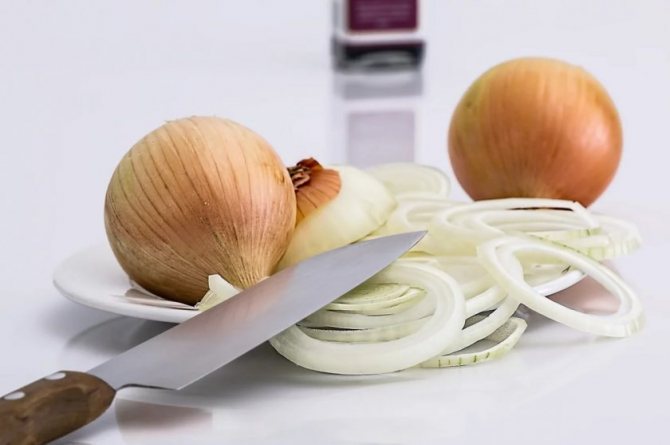
The most common causes of pain after consuming savory vegetables are diseases associated with gastrointestinal dysfunction.
Causes of pain
The main reasons causing pain after eating raw onion crops:
- Gastritis is a chronic disease. It is characterized by inflammatory and inflammatory-dystrophic changes in the mucous membranes with impaired regenerative functions. During the course of the disease, some of the epithelial cells and normal glands are replaced by fibrous tissue, under the influence of an increased amount of gastric juice. The progression of the disease leads to deviations in the functionality of the gastrointestinal tract, primarily secretory. The acute phase can be manifested by severe pain, vomiting, and diarrhea. An exacerbation can be caused by a one-time exposure to an irritant - spicy, salty, hot food or the ingestion of chemical irritants or certain groups of drugs into the body.
- An ulcer is a local disorder in the mucous membranes of the gastrointestinal tract, sometimes even involving the submucosal layer. In other words, wound surfaces are formed on the mucous membranes under the influence of hydrochloric acid, pepsin and bile secretions. This disease is characterized by a relapsing course, manifested by phases of remission and exacerbations. Typically, exacerbations occur seasonally (spring and autumn). When the ulcers heal, scars remain on the mucous membranes.
- Poisoning – after poisoning, painful sensations may occur. The fact is that after severe irritation, the mucous membranes need to recover, and under the influence of the substances contained in onions, gastric juice begins to be released faster, which leads to even greater inflammation of the affected tissues.
- Gastroenteritis is a disease that affects the gastric tract and small intestine. It is caused by viruses, E. coli, and other pathogens. It manifests itself more often in an acute form, less often a chronic course is observed. Main symptoms: vomiting, diarrhea, severe pain. With a lesion of this nature, special therapy and a diet are needed that excludes spicy foods, such as bulbous crops. Neglect of these requirements leads to the resumption of symptoms of the acute phase.
- Pancreatitis unites a group of diseases and syndromes characterized by the presence of inflammatory processes of the pancreas. With this disease, enzymes from the pancreas do not enter the duodenum, but begin to act immediately on the spot, which leads to tissue destruction. Treatment of such a disease also involves restrictive diets that exclude spicy foods.
User comments
After terrible attacks of cholelithiasis, I don’t really need any onions or garlic. I don’t want to abuse my body! I don't want to end up in the hospital.
Ekaterina Suprunova, Nope, there’s an enzyme with some clever name. I read about it a long time ago, I remember for sure that it is of natural origin. In short, straight girl))) But if you don’t believe me, read it on the Internet, now you can find a lot of information about everything, no problem!
I only eat garlic. I excluded onions. The gall bladder does not accept onions. Children love onions. They will eat them and immediately throw up. :(
so you most likely have an ulcer or gastritis, get checked
I have chronic gastritis. It’s just that the problem wasn’t so acute before. Everything else is digested well.
Every second person has chronic gastritis, forget it. And garlic, by the way, strengthens blood vessels)))
No, I don’t conduct experiments, I just ask people for advice. If you remove onions and garlic from dishes, the food becomes completely bland! Imagine, if, for example, you don’t add sauteed onions and carrots to soup, what will it be then, water with meat? ))))
Ok, thank you, I heard you.
It’s just that you eat garlic and onions in large quantities, you’ll stop flavoring them the first time you end up in the hospital with an attack of gastritis)) your head will immediately start thinking)))
eat more garlic, that's it. Two means problems with the gastrointestinal tract, rather than due to onions or garlic. Eat garlic and try less, that’s the only way. Or are you not talking about natural garlic and onions, but about seasonings? If you’re talking about seasonings, then it’s understandable
Why does garlic and onions cause heartburn?
Since ancient times, a large number of dishes have been prepared with garlic or onions. But they are consumed not only as a seasoning, but sometimes even separately in raw form.
They have beneficial substances, but can also cause gastrointestinal diseases. Very often this can be heartburn from garlic.
But you need to know what kind of disease this is and how it should be eliminated.
What is heartburn?
This disease causes a burning sensation in the chest and throat. When eating food, the lower sphincter in the esophagus opens and food enters the stomach.
After this, the sphincter closes and food begins to be digested. But if the muscles do not close tightly, then food, along with hydrochloric acid, goes back into the esophagus.
In most cases, this occurs with increased acidity, so an inflammatory process occurs in this area.
In particularly advanced cases, the formation of ulcers and erosions on the walls of the esophagus is possible. Heartburn can be an individual reaction to certain foods or as a consequence of the occurrence of chronic diseases.
Why does heartburn occur after eating garlic?
Eating onions and garlic fills our body with useful microelements.
They are able to enhance the protective properties of our body, so they are used to treat and prevent the occurrence of infectious diseases. Additionally, garlic is very good at eliminating microorganisms from the body.
But garlic can also cause heartburn. This arises from bitterness. It additionally helps stimulate the production of gastric juice.
Excessive amounts of hydrochloric acid irritate the muscles. At this time, juice refluxes into the esophagus, resulting in a burning sensation.
If gastrointestinal diseases occur, you can take garlic or eat onions only after heat treatment.
Benefits of use
Garlic has a healing effect:
- Contains abundant amounts of essential microelements. It contains allicin, which helps enhance protective properties. This is especially important during infectious diseases.
- Garlic is a good prevention and treatment of colds. This was confirmed more than once during the study.
- Taking onions speeds up metabolic processes in the body and also improves digestion.
- Onions are also very rich in vitamins and microelements. It contains vitamins A, B, C, PP.
- Consumption of these products has a positive effect on the functioning of the cardiovascular system.
Causes of heartburn from eating garlic
Garlic, like any other vegetable, increases the secretion of acid. In this regard, consuming it in large quantities is prohibited.
Due to the fact that more gastric juice is secreted, heartburn will appear very soon.
Garlic can be added as a seasoning when preparing any dishes. It is prohibited to consume it raw. If a larger amount of acid is released, then its excess begins to injure the esophagus and larynx.
Discomfort such as heartburn occurs, and erosions and ulcers may also appear on the walls of internal organs.
Also, these symptoms may appear if a person has an individual intolerance to these products.
How to eliminate heartburn symptoms
Garlic has enormous positive properties, so it is necessary to find a way to circumvent the negative aspects of the product. You can avoid heartburn with the following tips:
- It is strictly forbidden to take garlic on an empty stomach.
- You need to stop taking it raw. You can use it to prepare dishes in the oven, slow cooker, boil or fry.
- It helps to eliminate heartburn attacks if you take a glass of milk after eating garlic.
Why is it important to consult a doctor?
Heartburn cannot lead to serious illnesses, but in most cases it indicates the presence of chronic diseases of the gastrointestinal tract or an individual reaction to taking garlic.
Most people try to relieve symptoms and do not eliminate the causes of heartburn. To do this, they use milk, potato juice or baking soda.
It is necessary to pay attention to the cause of the disease.
It is almost impossible to determine the disease at the initial stage. Moreover, with constant employment, health problems fade into the background.
Often diseases “reveal” themselves when it is too late. You should pay attention to prevention.
The presence of chronic diseases of the gastrointestinal tract can lead to serious consequences. For example, heartburn can cause excessive salivation.
This aggravates the presence of burns in these organs. Gradually, a problem such as rupture of the esophagus, bleeding of internal organs, or even the growth of a benign or malignant tumor may arise.
Therefore, it is very timely to eliminate heartburn, and eat garlic only not in its raw form.
jeludokbolit.ru
Treatment of granular gastritis
In most cases, the term “granular gastritis” is used to describe the endoscopic picture that a functional diagnostics doctor sees when performing fibrogastroduodenoscopy. It is characterized by focal changes in the mucosa in the form of small protrusions. Treatment of hypertrophic granular gastritis is symptomatic, since the cause of the disease is not clear.
The basis of therapy is:
- use of antibiotics: with a positive test for Helicobacter pylori (clarithromycin, amoxicillin);
- enzyme preparations: to improve digestion (Mezim, Creon);
- antispasmodics: to reduce pain (no-spa);
- rational diet therapy: avoiding fatty, fried, spicy foods, eating small portions - 4-5 times a day;
- quitting smoking and drinking alcohol;
- creating maximum psychological comfort: – avoid stress, normalize work and rest, sleep at least 8 hours a day, spend more time in the fresh air.
Diet for the treatment of granular gastritis
The diet for the treatment of granular gastritis should be varied and balanced in composition, containing all the necessary vitamins and minerals
The success of the treatment directly depends on the strict adherence to nutritional recommendations. The choice of diet for granular gastritis varies depending on the degree of acidity of gastric juice.
General dietary recommendations for granular gastritis:
- food must be chewed thoroughly, food must be eaten slowly;
- food portions should be small;
- 5-6 meals a day are welcome;
- the diet should be varied and balanced in composition, contain all the necessary vitamins and minerals;
- food should be warm (too high or low temperature irritates the mucous membrane);
- Flour, fried, spicy, smoked and canned foods are prohibited;
- it is necessary to give up alcohol, smoking, coffee;
- Cooking methods such as boiling and stewing are welcome;
- with low acidity, use rich broths, sweet and sour fruits, mineral water without gases, which is prohibited with high acidity.
This type of gastritis is dangerous due to its complications; hypertrophy of the mucous membrane can provoke gastric bleeding or the development of tumors, so you should not delay consulting a doctor at the slightest suspicion of the onset of the disease.
Onion composition
The pungent taste and pungent aroma of onions is due to the presence of essential oils in its composition. It contains vitamin C, more of it than oranges . In addition, onions contain folic acid, retinol, tocopherol, B vitamins, and minerals.
The composition of onions includes microelements such as:
The protein component is represented by eighteen types of amino acids. In addition, the vegetable contains natural sugars (fructose, inulin, glucose), pectins, saponins, flavonoids (quercetin).


